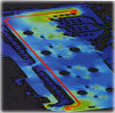Departments
Department of Electrical Engineering
 The Department of Electrical Engineering was established in 1976, and its MS and Ph.D. programs were founded in 1977 and 1983, respectively.
The Department of Electrical Engineering was established in 1976, and its MS and Ph.D. programs were founded in 1977 and 1983, respectively.
The undergraduate curriculum stresses a balance of theoretical studies and hands-on experimental training. It covers all areas of electrical engineering, including optoelectronics and electromagnetics, solid-state electronics, VLSI design and computer engineering, control and system theory, communications and signal processing, and power engineering. More than one third of the courses are taught in English.
Research areas include power systems and power electronics, multimedia, and signal processing, communications, design and testing of VLSI circuits, computer engineering, biomedical engineering, bioinformatics and quantum computation, and quantum communications.
Department of Computer Science
 The Department of Computer Science has an undergraduate curriculum that is very flexible. Except for a few required courses, students are free to select from a wide range of specialized courses in designated areas based on their own interests.
The Department of Computer Science has an undergraduate curriculum that is very flexible. Except for a few required courses, students are free to select from a wide range of specialized courses in designated areas based on their own interests.
The graduate program grants MS and Ph.D. degrees to qualified candidates. The courses offered cover all major areas of computer science and engineering. All faculty members and graduate students actively participate in both domestic and international academic activities.
Major research areas include high-speed networks, image processing, databases, algorithms, graphics, electronic design automation (EDA), artificial intelligence, natural language processing, and parallel and distributed systems.
Interdisciplinary Program of Electrical Engineering and Computer Science
The Interdisciplinary Program of Electrical Engineering and Computer Science was established in 2008 to meet the growing demand for engineer with cross-disciplinary expertise. Through rigorous training in both EE and CS, we expect to educate wide-spectrum professionals who could enhance the competitiveness of Taiwan by upgrading to even higher value-added industry. The curriculum of this undergraduate program covers the basic principles of various advanced technologies including computer information theory, internet, multimedia, communication, control, energy, biomedical electronics, IC design, photonics, nanometer semiconductor, etc.
Institute of Electronics Engineering
 The Institute of Electronics Engineering was established in 1996 and offers MS and Ph.D. degrees.
The Institute of Electronics Engineering was established in 1996 and offers MS and Ph.D. degrees.
Major research areas include communications electronics, power electronics, nano-electronics, thin-film electronics, MEMS, and optoelectronics.
The curriculum is designed to provide students with a strong foundation of elemental knowledge, encourage broad perspectives, and foster solid hands-on ability. The institute has strong ties with relevant industries, in terms of both research activities and student training.
Institute of Communications Engineering
 The Institute of Communications Engineering was established in 1999. It covers teaching and research activities in communication systems and communication networks.
The Institute of Communications Engineering was established in 1999. It covers teaching and research activities in communication systems and communication networks.
Main research areas in this Institute include broadband communications, wireless communications, digital communications, error correction codes, signal processing for communications, VLSI for communications, optical communications, broadband Internet, wireless networks, high-speed networks, multimedia networks, fiber-optical networks, communication network theory, network management, and networking chip design.
Institute of Information Systems and Application
The Institute of Information Systems and Applications was established in 2001.
Its major research areas are Internet-based multimedia information systems and applications.
The graduate programs offer students the opportunity to learn about multidisciplinary fields and information application related professions, such as multimedia technology, information and communication media, digital libraries, digital contents, digital rights management, electronic commerce, effortless networking environment, and medical information systems.
Institute of Photonics Technologies
 The Institute of Photonics Technologies was founded in 2003 from the Photonics Group of the Electrical Engineering Department.
The Institute of Photonics Technologies was founded in 2003 from the Photonics Group of the Electrical Engineering Department.
Its research areas include optical communications systems and devices, opto-semiconductors, display technologies, laser physics and applications, nonlinear optics, and photonics materials and devices. Both MS and Ph.D. degrees are offered.
Institute of Information Security
The Institute of Information Security was established in 2019. We offer master programs in order to educate high-level cyber security professionals, cultivate the competencies of interdisciplinary cyber security talents, promote the development of information security industry and make the academic performances of cyber security prominent in the world.
Our research fields vary from computer science to internet security, including detection, defense, management and supervision of information technologies. Faculties of the Institute of Information Security consist the team of professors who are specialized in cyber security as well as related disciplines from NTHU and other prestigious schools.
